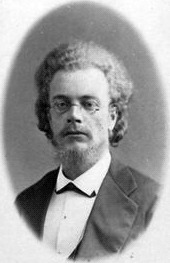
Sergei Petrovich Melgunov (Russian: Серге́й Петро́вич Мельгуно́в) (December 24 or 25, 1879 – May 26, 1956) was a Russian historian, publicist and politician best known for his opposition to the Soviet government and his numerous works on the Russian Revolution of 1917 and the Russian Civil War.
Melgunov was born in Moscow to an old aristocratic family. His mother was Polish, née Gruszecka. Having graduated from Moscow University in 1904, he began his political and scholarly career in Imperial Russia. He became a member of the Russian Constitutional Democratic party (“Cadets”) in 1906 and joined the People’s Socialist Party in 1907. In 1911, Melgunov established a publishing house Zadruga ("Задруга") where he published over 500 books and a journal Golos minuvshego ("The Voice of the Past"). After the 1917 Bolshevik October Revolution, he became an active opponent of Lenin’s government and joined the anti-Soviet Union of Revival of Russia, which advocated an armed overthrow of the Bolshevik regime.
He was arrested and sentenced to death in 1919, then reprieved, with the sentence commuted to imprisonment. He was released in 1921 and forced into exile in 1922. Melgunov finally settled in Paris, where he continued his historical research and edited several émigré journals. His most famous book is Red Terror in Russia (Russian: Красный террор в России) published in 1924. Historian Robert Gellately describes Melgunov's pioneering study of the Red Terror as "a detailed and shocking account" which "has been confirmed by recent revelations from the Russian archives and by historians.".[1] Conversely, French historian Jean-Jacques Marie, Russophone and veteran specialist in the history of the Soviet Union, has more recently credited Melgonov with the wholesale invention of at least one "legend" about the Red Army: "The Crimea is the location of the last military confrontation between Red and White forces. The battle there fought bred contradictory narratives and legends, like the many-times repeated one (since its invention in 1923 by a certain Melgunov) according to which, after Wrangel's defeat, Trotsky executed, not only 500 dockers (!), but also 50,000 soldiers and officers of this army ; yet the vast majority of this army had succeeded in leaving by boat!".[2] Indeed, according to Wrangel's officers' own published accounts, "Wrangel's general staff succeeded in evacuating about 145,000 men out of an army of a little more than 150,000. The 50,000 officers of Wrangel's army that several "historians" have Trotsky and Bela Kun execute issue thus from an imagination that, while fertile, proves incompatible with arithmatics".[3]
References
- N. Oulianoff (July 1958). "In Commemoration of S. P. Melgunov". Russian Review. 17, No. 3 (3): 193–200. JSTOR 126140.
- ^ Robert Gellately. Lenin, Stalin, and Hitler: The Age of Social Catastrophe Knopf, 2007 ISBN 1-4000-4005-1 p. 72.
- ^ Marie, Jean-Jacques (2016). Histoire de la guerre civile russe. Tallandier. p. 281. ISBN 979-10-210-1008-6.
- ^ Marie, Jean-Jacques (2016). Histoire de la guerre civile russe. Tallandier. p. 288. ISBN 979-10-210-1008-6.
Bibliography
- Petrovich Melgunov, Serge (1975). Красный террор в России [Red Terror in Russia]. Hyperion Pr. ISBN 0-88355-187-X.
External links
- (in Russian) His works and biography
- The Record of the Red Terror by Sergei Melgunov